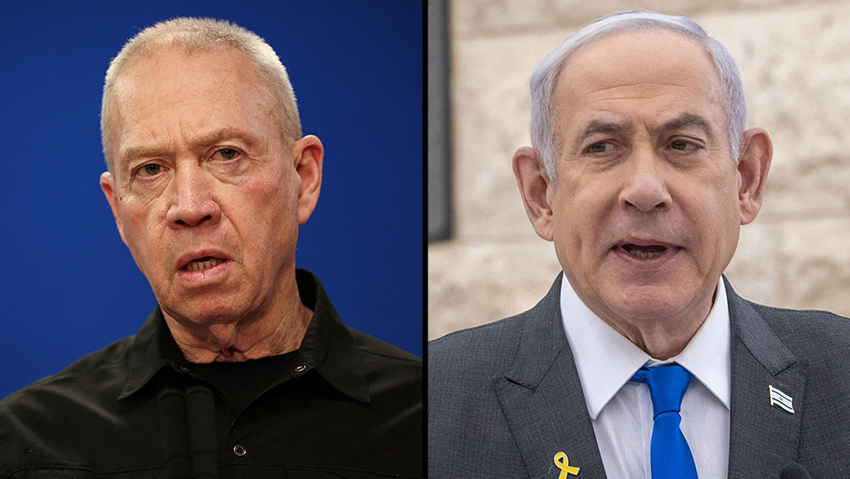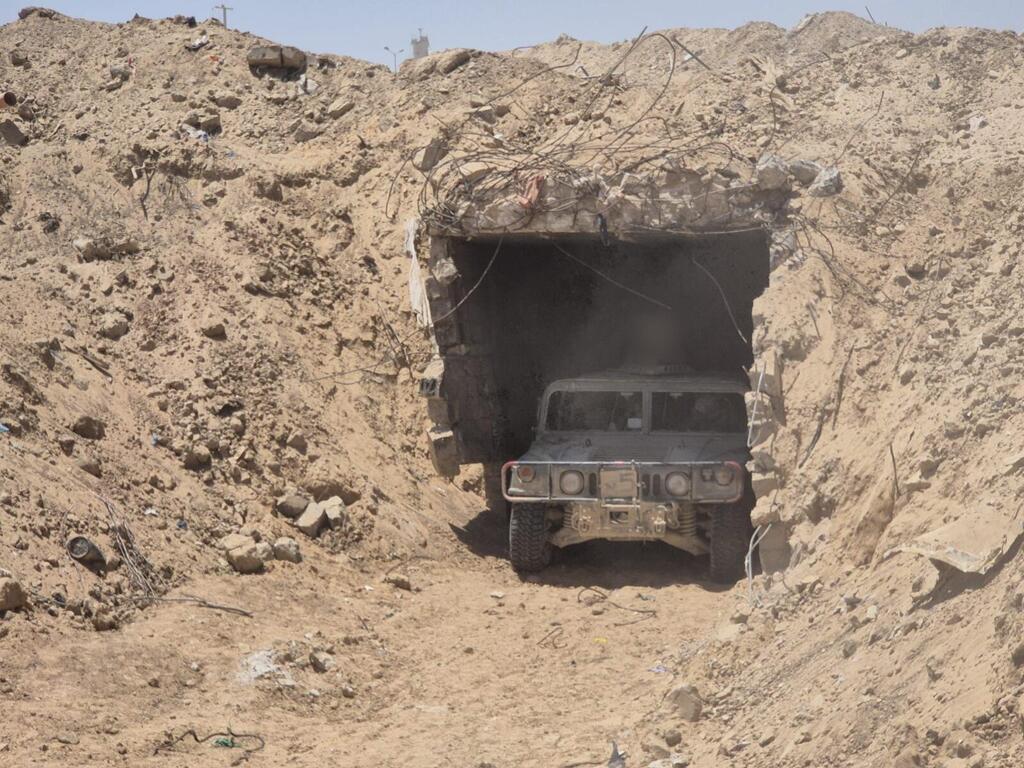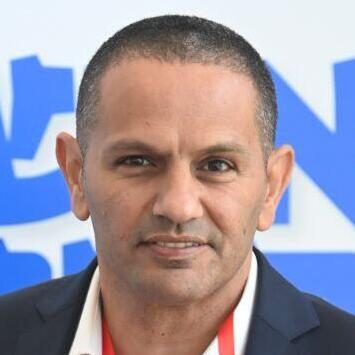There is no doubt that the actions of Iran and Hezbollah will influence the cease-fire negotiations in Gaza. However, until that happens, the defense establishment continues to push for an agreement, even if it does not secure the release of all hostages at one time. A senior security official, who is apolitical and privy to the details, said: "It is clear we would like to release all the hostages, especially the living ones, at once. But we need to move forward with a deal in the current timeframe to save as many hostages as possible."
2 View gallery


Netanyahu and Gallant arguing while hostages languish
(Photo: Haim Goldberg, REUTERS/Violeta Santos Moura)
The senior official clarified: "We will bring everyone back, reorganize and return to the fight." He added that "a cease-fire is not the end of the war." When asked if the current deal is good, the official responded frankly: "No. Clearly, I would like to release many more living hostages. But is the deal right for now? Yes. This is the maximum I can get at the moment, and I want to save as many hostages as possible."
The same senior official, like the rest of the defense establishment, was not perturbed by Hamas' Sunday announcement that the organization would not send representatives to the summit on Thursday. Professional sources, who are not political, say that Hamas' goal is not to blow up the talks but to improve conditions in the negotiations. In fact, the establishment believes that Yahya Sinwar is highly likely interested in an agreement at this stage, as the elimination of Mohammad Deif and other senior figures was an effective leverage and also an understanding that the Hamas leader is next in line.
"The public in the Gaza Strip understands well that eliminating Sinwar will solve half of its problems and advance the end of the war," says a senior official in the system. "Therefore, we need to achieve this success."
'The insistence in the negotiations is substantive and not political'
However, in the meantime, the dispute is not only between Israel and Hamas but also within Israel. On Monday, there was another significant escalation in the relationship between Prime Minister Benjamin Netanyahu and Defense Minister Yoav Gallant, who were arguing frantically while the public looks to them for hope. It is hard to overstate the damage caused to national resilience, especially at a time when everyone is required to muster all their strength to stay sane. But this does not seem to persuade Gallant and Netanyahu, who behave like two tired and worn-out boxers in a match for a medal in an already finished Olympics.
Therefore, it is important to listen to what a senior officer, who knows well the arguments, briefings and suspicions between Netanyahu and the security system, told Ynet.
"Even if senior officers think differently from the prime minister regarding the hardening of positions in the negotiation framework, Netanyahu's stance derives from substantive, not political, motives," he says. "In the military system, there is consensus and agreement regarding the effort of the political echelon, both around Netanyahu and the defense minister, to drag senior officers into political disputes. I think differently from Netanyahu but believe that the insistence in the negotiations is substantive, not political, and significant, regarding the Philadelphi Corridor, the Rafah crossing, and the issue of residents returning to the northern Gaza Strip."
2 View gallery


A Hamas tunnel located near the Philadelphi Corridor
(Photo: IDF Spokesperson's Unit)
Nevertheless, the same officer adopts the system's position, which argues that it is possible to deal with these issues and not miss the window of opportunity, perhaps the last one, to save living hostages. The system even contends that there is a way to square the circle concerning the contentious issues while using every minute to operate on the Philadelphi Route and dismantle the tunnel empire established there during Hamas's years of empowerment.
"We must continue to act and dismantle the underground infrastructure," says a military source familiar with the Philadelphi operations. "Even if most of the tunnels have not been active in recent years, we must destroy their infrastructure – and it takes time."
Current military operation not conducive for a deal
Another source admits that "the military activity to destroy the infrastructure on the Philadelphi Corridor could clash with the conditions of a future deal to release hostages." But the defense establishment believes creative technological solutions, both short-term and long-term, will be found to help detect tunnels or smuggling attempts, and that they will also be acceptable to the mediating countries.
The question remains, will the public trust these assessments after the defense establishment's failure to stop the invasion that left Israel wounded and bleeding on October 7?
The Rafah crossing has been and remains one of the points of contention in the negotiations. Israel firmly refuses Hamas' presence on the Gaza side of the crossing. This is an Israeli precondition that isn't going away any time soon. The gap in the Israeli system – mainly between the security and political echelons – is the identity of those who will be there. The IDF, Mossad and Shin Bet want to see Palestinian representation along with some international organization, even if it involves Palestinian elements close to or connected with the Palestinian Authority. This is a framework that will be acceptable to the mediators and will help pressure Hamas, which will lose, in its view, a governmental status symbol to the Palestinian Authority, its arch-nemesis.
On the other hand, the political echelon has not yet crossed the Rubicon involved in such a decision. Presumably, this will not add to the coalition's stability, which is already in doubt as to whether it will survive the release of murderers expected in any scenario of an agreement. Meanwhile, the mediators –mainly Egypt – are exerting a lot of pressure on both sides regarding the Rafah crossing. Opening the crossing is important to Cairo both publicly and economically.
'Political echelon will have to compromise'
In the end, almost all the sources we spoke to said that the political echelon will eventually have to compromise, as there will be no public legitimacy to refuse a deal just because a Palestinian element connected in some way to the Palestinian Authority will stand at the Rafah crossing instead of Hamas police.
"The political echelon will have to compromise here and allow their presence at the crossing," says a senior security official. "Within Gaza, I don't see the possibility of the Palestinian Authority's return right now. The Egyptians are very pressured for us to open the crossing. It is important to them also in light of internal public opinion to show that they are providing humanitarian assistance to the residents of Gaza, and of course, it is also important to them economically," the official said.
Launch pads along the Philadelphi Corridor
(Video: IDF Spokesperson's Unit)
Another gap accompanying the negotiations for many months is the return of Gaza residents to the northern Gaza Strip. The IDF, like the Shin Bet, is mainly concerned about the return of terrorists and the limited ability to prevent their infiltration, once the population is given permission to move north. The political echelon is also concerned about the perceptual aspect of the move.
"A reality where Gaza residents return to homes in the north while not all kibbutzim in the area have been afforded the same luxury is difficult to explain or justify," a political source explained in a conversation with security officials.
In any case, if Israel allows the return of residents to the northern Gaza Strip, the move will have to be carried out in a gradual and wise manner, under close security supervision, both intelligence-wise and in the buffer zone between Gaza and the Israeli communities.




